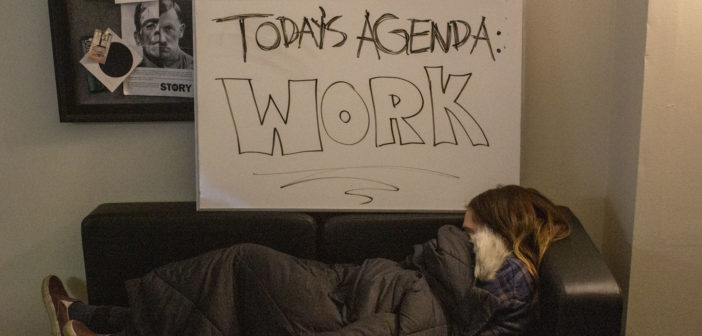Unless you work in the production of sleeping bags, its presence in the workplace should not be a common occurrence. Unfortunately for too many video game developers, this item has become a necessity to pack when heading to work at the start of a busy week.
In the video game industry, “crunch culture” is all too common and, for many developers, it seems as if there is no practical solution.
“Crunch” is defined by the Take This study “State of the Industry 2019” as “the practice of working long hours, beyond the traditional 40-hour working week, consistently for extended periods of time.” The study goes on to clarify that crunch “can be either mandatory or insinuated through cultural norms in order to meet specific deadlines.”
Developers are put in a hard position from their management when it comes to the “crunch.” Do they take their time off, miss their deadlines and potentially put their jobs at risk or do they put in the extra hours and suffer in their personal lives?
The problem is that there aren’t many options when it comes to unionizing in the U.S. for video game developers. Intel co-founder and “mayor of Silicon Valley,” Robert Noice said in the book “Silicon Valley Fever” that “if we had the work rules that unionized companies have, we’d all go out of business.”
This type of attitude toward workers may be harmful. The fact that Noice recognizes the power imbalance in the industry and encourages it shows that some business owners care more about what they can do than how they can do it. Without legislation that dictates the fair treatment of developers, they will be mistreated.
“The whole reason that unions exist is because no one looks out for the little guy,” Game Writer Gary Whitta said on the Kinda Funny Games Daily podcast on October 17, 2018. “(Studios) often prioritize the product over the people.”
An important part of Take This’ definition of “crunch” is the idea that it doesn’t need to be mandatory to be a problem. All too often it’s a studio’s work culture that puts pressure on developers to work long hours and say nothing about it.
“If you see your boss working (100-hour work weeks), how do you feel when you get up at 6 p.m. and you walk past his office to get to the front door?” Greg Miller said on the Feb. 5, 2020 edition of the Kinda Funny Games Daily podcast.
In many studios, developers continue working despite being exhausted and overworked because their bosses and friends are working long hours as well. They think that it’s the norm of being a video game developer. This shouldn’t be the case.
In order to change that norm, the culture of the workplace needs to change on an industry level. To make largescale changes like that, new legislation needs to be written or unions for developers need to be more commonplace.
In 2018, Telltale Games, the studio responsible for hit point-and-click adventure games, such as “The Walking Dead” and “The Wolf Among Us,” suddenly closed its doors and, without warning, left hundreds of employees jobless and without severance.
According to Kotaku.com, an inside source told them that they had been “working until 3 a.m. the night before with no inkling that the studio was about to let them and over 200 other employees go.”
The studio’s immediate closure, while workers were unaware and putting in overtime hours, was something that shouldn’t have been legally permissible. However, due to loopholes in California law, this still happened. Embracing unions in the industry would help regulate studios and put pressure on them to treat their employees fairly.
“(Crunch) is certainly one of the most public and tangible issues around which workers are calling for unionization and labor organizing in the industry,” said Emma Kinema, one of the organizers behind Game Workers Unite, in Variety’s article, “Despite Resistance, Crunch Continues to Define the Video Game Industry.”
“There are so many more issues to organize around … such as mass temp contract employment, employee miscategorization, unsustainable hiring practices, lack of severance, no crediting standards, unstable job-based health insurance, and more,” said Kinema.
The games audiences enjoy don’t just originate from nowhere. They came from hardworking people and if they aren’t given proper rights as workers, they won’t continue making games. Sleeping bags should be for vacation hours, not overtime.

